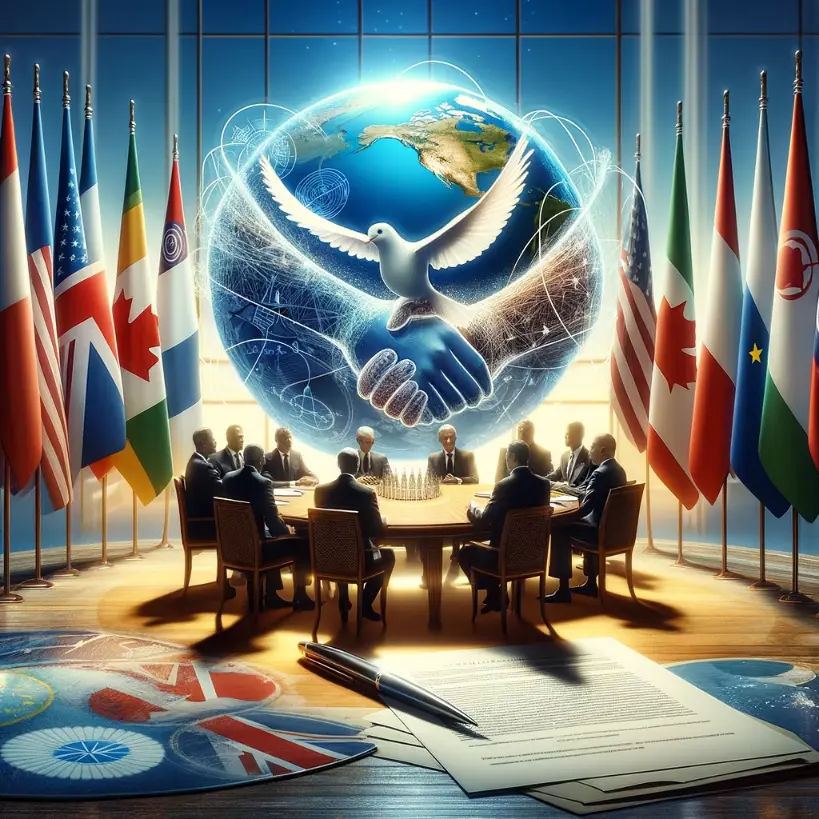The geopolitical landscape is shifting in a manner that, alarmingly, favors North Korea’s strategic breakout from international isolation. Central to this development are several interrelated dynamics that are reshaping the global order.
The Russian invasion of Ukraine marks a significant erosion of global cooperation and adherence to international norms. This disturbance in the geopolitical equilibrium provides North Korea with an advantageous environment to pursue its interests with diminished global scrutiny and consequences.
The increasingly defiant stances of Iran and Syria, coupled with the looming threat of a Chinese incursion into Taiwan, are contributing to the formation of a coalition of nations that are resisting the liberal international order. This resistance is characterized by a growing acceptance of engaging in illicit interactions with North Korea, thereby bolstering Pyongyang’s capacity to navigate international sanctions with greater impunity.
North Korea’s historical ability to manipulate superpower rivalries for its benefit is again coming to the fore. The decline in the enforcement of United Nations Security Council resolutions, particularly those aimed at curbing North Korea’s weapons programs, highlights this trend. Kim Jong Un’s proactive engagement with China and Russia, as evident from his series of meetings with Xi Jinping and Vladimir Putin, underscores a strategic effort to fortify alliances that are crucial to breaking North Korea’s isolation and enhancing its global influence.
This shift in international relations is further exemplified by the presence of high-ranking Russian and Chinese officials at a North Korean military parade, signaling an unprecedented level of military and political cooperation. With the anticipated reopening of its borders post-pandemic, and an expected surge in trade with China, North Korea is strategically positioning itself to emerge from its seclusion, strengthened by a network of revisionist allies. This evolving scenario presents a formidable challenge to the existing global order, highlighting the need for a recalibrated approach in addressing the complexities of North Korea’s international relations.
The war in Ukraine has significantly impacted the geopolitical dynamics between Russia, North Korea, and the international community, leading to increased collaboration and mutual profiteering between Moscow and Pyongyang. Russia’s aggressive stance against Ukraine and the subsequent deterioration of its relations with the United States and Europe have resulted in a lax enforcement of UN sanctions against North Korea. This shift is evident in Russia’s praise of North Korea’s defensive developments and its collaboration with China to block new Security Council resolutions against North Korea, as well as efforts to undermine the monitoring of sanctions implementation.
Russia’s growing partnership with North Korea is increasingly driven by self-interest. North Korea is providing Russia with military supplies, including artillery shells and missiles, in exchange for food and commodities. This transaction is further facilitated by intermediaries, as indicated by the U.S. Treasury Department’s sanctions against a Slovakian arms dealer involved in these exchanges. The U.S. State Department is concerned about the possibility of North Korea increasing its weapon shipments to Russia, which would support Russia’s ongoing invasion of Ukraine and potentially shift the nuclear deterrence dynamics on the Korean Peninsula.
The relationship also extends to political support, with North Korea being one of the few nations recognizing Russia’s claims over territories in eastern Ukraine and potentially sending construction workers there, a move that violates UN sanctions. This support is reciprocated by Russia’s willingness to host North Korean workers, representing a political benefit for Pyongyang.
As Russia’s conflict with the international community intensifies, including its withdrawal from the New START nuclear arms control treaty, North Korea finds itself in a position to expand its opportunities. It can sell more weapons, export more workers, and earn more profits to fund its illicit nuclear and missile programs. This symbiosis between Russia and North Korea, fueled by mutual interests and opposition to Western policies, is likely to persist and deepen as long as the current geopolitical tensions continue.
The Middle East is witnessing increasing tensions and proliferation activities involving North Korea, Iran, and Syria. The U.S. has struggled to reengage Iran in a nuclear deal since the Trump administration’s withdrawal, leading to deteriorating U.S.-Iran relations and heightened internal unrest in Iran. North Korea has had a longstanding relationship with Iran, particularly in arms trading since the 1980s and missile cooperation. There have been concerns and some indications of North Korea and Iran collaborating on nuclear technology.
North Korea’s proliferation extends to Syria as well, supplying missiles and helping construct a plutonium reactor. Israel destroyed this reactor in 2007, but North Korea continued to support Syria, including during its civil war. The situation is complicated by the potential for further deterioration in U.S.-Iran relations and Iran’s possible decision to resume its weaponization program with North Korea’s help. North Korea’s proliferation activities serve its interests by generating revenue, aiding U.S. adversaries, and diverting attention from its own nuclear endeavors.
The United States must prioritize active collaboration with international allies and partners to effectively address global security challenges. Establishing global coalitions based on shared values is essential, moving beyond the current practice of forming region-specific alliances. This global approach is crucial in addressing interconnected issues worldwide.
Engaging with competing states through confidence-building measures, communication channels, and diplomatic dialogues is vital to prevent crises. The U.S. should focus on de-escalation and fostering peaceful relations, considering concessions for peace when necessary, such as negotiating with North Korea.
Enforcing sanctions is a critical aspect of the diplomatic strategy. This requires extensive international collaboration to monitor and disrupt proliferation activities, maintaining commitment despite the challenges of sanctions fatigue.
Strengthening alliances with South Korea and Japan is crucial, focusing on shared information, defensive strategies, and adapting deterrence approaches to evolving threats. Improvements in missile defense systems and updating nuclear capabilities are part of this strategy.
The U.S. must broaden its strategic planning in intelligence and military areas, preparing for the possibility of multi-front conflicts and overcoming biases that limit risk assessment and preparedness.
In summary, proactive and comprehensive international cooperation, strategic planning, and alliance strengthening are key to effectively managing global security challenges.
